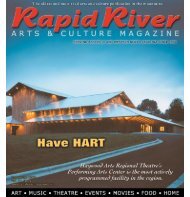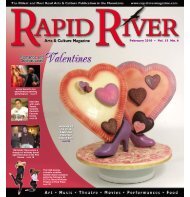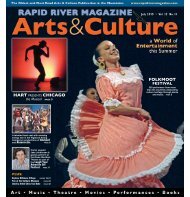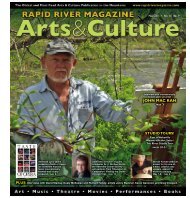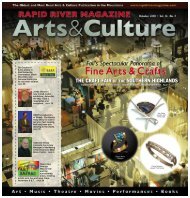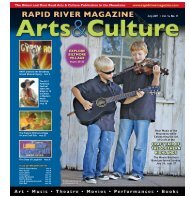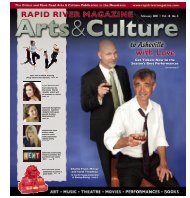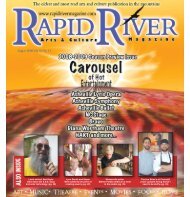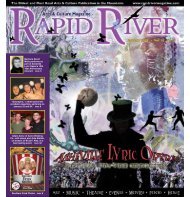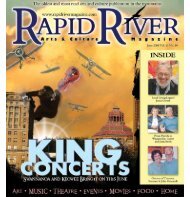Porgy & Bess - Rapid River Magazine
Porgy & Bess - Rapid River Magazine
Porgy & Bess - Rapid River Magazine
You also want an ePaper? Increase the reach of your titles
YUMPU automatically turns print PDFs into web optimized ePapers that Google loves.
R A P I D R I V E R A R T S & C U L T U R E M A G A Z I N E<br />
poetry & books<br />
The Compassion of Linda Parsons Marion<br />
Linda Parsons Marion, a resident of Knoxville, Tennessee,<br />
is among the most influential contemporary<br />
poets living in and writing about Appalachia. Her<br />
poems have been widely published, appearing in<br />
two books, in several anthologies of regional literature,<br />
and in such leading literary periodicals as Georgia Re-<br />
view,<br />
Prairie Schooner,<br />
Iowa Review,<br />
Louisiana Literature,<br />
and Asheville Poetry Review. Additionally, she was the<br />
longstanding poetry editor for the regional magazine Now<br />
and Then, and in that role she encouraged numerous other<br />
poets in their own artistic explorations of Appalachia and<br />
Appalachian life.<br />
While historically much “Appalachian” poetry has<br />
trended either toward sentimentality or toward hard<br />
realism, her poems have admirably walked a difficult<br />
middle ground. Marion’s poetry expresses deep compassion<br />
toward the world, yet it also asks tough questions and<br />
does not shy from the psychological complexity of human<br />
memory. Her poetry is thoroughly modern yet is profoundly<br />
aware of the value of the past.<br />
A new collection of Marion’s poetry, Mother Land<br />
(Iris Press, 2008), showcases the full range of her work<br />
(her earlier collection was Home Fires, published by Sow’s<br />
Ear Press in 1997). Many of the 59 poems in Mother Land<br />
draw from vividly recreated personal experiences, yet her<br />
work avoids the shock value of old-school confessionalist<br />
poetry by balancing the power of revelation with an emotional<br />
distancing achieved through her direct yet sophisticated<br />
approach to phrasing.<br />
For example, the poem “Animal,” while conveying the<br />
poet’s feelings of youthful alienation from a dysfunctional<br />
family, sidesteps the pitfalls of self-absorption by employing<br />
language that descriptively celebrates the world:<br />
BY TED OLSON<br />
In the big rancher, they won’t see me<br />
slip down the bank: Oliver and Betty Sue,<br />
Buford and Evelyn, Richard and my mother —<br />
and I, another man’s child. The men switch<br />
from sweet tea to Falstaff; the women<br />
wear beehives and ankle bracelets, smash<br />
cigarettes in their plates of cold eggs.<br />
While the situation depicted in “Animal” is highly<br />
personal, the poet renders the experience familiar to readers<br />
through her use of powerfully and precisely phrased, commonplace<br />
details.<br />
One of the predominant themes in Marion’s poetry<br />
is the poet’s keen understanding of and identification with<br />
the natural world. Some of her poems are lush with garden<br />
imagery, such as the poem “Unearthed”:<br />
Come midsummer I work the high ground<br />
to remember. Succulents and lavender, all<br />
that prospers in the mealy clay, untold lives<br />
leached farther down the bank. I dig to weed out,<br />
reveal what remains of my early uprooting:<br />
The poems in Mother Land<br />
not only seek to praise<br />
nature — or, from Marion’s unabashed perspective, Mother<br />
Nature — but they also labor to honor the women in Marion’s<br />
life (the book is dedicated to “the women who steadied<br />
my ground”) as well as the poet’s relationships with other<br />
family members and friends. “Wedding Poem,” for instance,<br />
testifies to Marion’s love for her husband, fellow poet Jeff<br />
Daniel Marion; that poem is tender, wise, and passionate in<br />
its evocation of the meanings of marriage<br />
Another example of Marion’s gift<br />
for lyricism can be found in the prose<br />
poem “Credo,” which, as the initial<br />
offering in Mother Land, serves as a<br />
compelling invocation to the rest of<br />
the poetry in the volume. Interestingly,<br />
“Credo” was adapted from a<br />
longer essay created by Marion for use on<br />
“This I Believe,” a regular feature on National Public Radio;<br />
and in this new context, “Credo” eloquently invites the<br />
reader to see a familiar Appalachian landscape in a new light:<br />
I believe I will stand at the opened earth and grieve for<br />
the wasteland we’ve ridden far and wide, light slanting on<br />
hills we never stopped to admire. I believe grace will carry us<br />
there if we lean into the hairpin curves, pedal hard, in life or<br />
after, beyond the blue rise.<br />
Ted Olson is the author of Breathing in<br />
Darkness: Poems<br />
(Wind Publications,<br />
2006) and Blue Ridge Folklife<br />
(University<br />
Press of Mississippi, 1998) and the<br />
editor of CrossRoads: A Southern<br />
Culture Annual<br />
(Mercer University Press,<br />
2009). His experiences as a poet and<br />
musician are discussed on www.windpub.com/books/<br />
breathingindarkness.htm.<br />
Poets who would like for their poetry to be considered for a<br />
future column may send their books and manuscripts to Ted<br />
Olson, ETSU, Box 70400, Johnson City, TN 37614. Please<br />
include contact information and a SASE with submissions.<br />
Letter to My Daughter<br />
Written by George Bishop<br />
Upon receipt of George<br />
Bishop’s novel, Letter to My<br />
Daughter, I was a bit… unsure.<br />
How can a man, any man, possibly<br />
know what it feels like to be<br />
a teenage daughter full of angst<br />
and rebelling against her seemingly<br />
unhip mother and then<br />
put those experiences and raw emotions<br />
into words… and then make those words<br />
come together to illicit such intense feeling<br />
and just honest dead on accuracy. Miraculously,<br />
for those of us who love to get<br />
lost in books and live with the characters,<br />
Bishop has done the almost impossible.<br />
After a blow-out fight ending in her<br />
daughter, Liz, walking out on her and<br />
the family, Laura<br />
begins to write a<br />
MARCH<br />
BOOK<br />
REVIEWS<br />
BY BETH GOSSETT<br />
heart-wrenchingly<br />
honest letter to her<br />
daughter about her<br />
own life, how she<br />
rebelled against her<br />
parents for almost<br />
the same reasons<br />
that Liz rebels against her and how<br />
the decisions and the experiences<br />
she had impacted her life. Laura<br />
rationalizes how her daughter must<br />
see her in her adult years and how<br />
she, quite possibly, cannot view her<br />
mother as anything less than some<br />
overwrought, hen-pecking<br />
brute of a task master.<br />
However, through<br />
Laura’s brutal honesty, which<br />
is almost a confession of sorts,<br />
and her desire to repair a relationship<br />
with Liz, we see Laura for the young<br />
girl and woman she has grown to be.<br />
We see her in the midst of her first<br />
love, how it is stripped away from her<br />
by her parents, how she copes with her<br />
boyfriend being sent to Vietnam in the<br />
turbulent years of that war and how she<br />
realizes that, after having the opportunity to<br />
attend an exclusive Catholic school, maybe<br />
there is more to life than marriage right out<br />
of high school and it makes her all the more<br />
human, and hopefully easier for her daughter<br />
to relate to, understand… and ultimately<br />
forgive for past transgressions.<br />
Bishop has truly hit the mark with his<br />
first published novel. I could not possibly<br />
give him any higher praise than to recommend<br />
that all mothers and daughters pick<br />
up a copy of Letter to My Daughter, savor<br />
each and every word, and look on each<br />
other with new illuminated eyes. I cannot<br />
wait to see what Bishop presents for an<br />
encore. Cheers!<br />
The Many Deaths<br />
of the Firefly<br />
Brothers<br />
Written by Thomas Mullen<br />
This has just been my<br />
month for being graced with<br />
reviewing exceptional novels<br />
and Thomas Mullen’s The<br />
Many Deaths of the Firefly Brothers is no<br />
exception. I was literally sucked into this<br />
novel in the first two or three pages.<br />
It’s a novel that takes place during the<br />
Depression Era (and it is so eerie that it<br />
almost parallels some of the social/economic<br />
disasters that we’re seeing right now) where<br />
we meet the dashing and sometimes irreverent<br />
Fireson brothers (Jason and Whit)<br />
who have been on a yearlong bank robbing<br />
BOOK REVIEWS BY BETH GOSSETT<br />
spree across the country.<br />
We actually meet them after they have<br />
been apprehended…well, actually they’ve<br />
been killed, and they’re in the morgue…<br />
riddled with bullets, but somehow,<br />
they’ve been resurrected…to start life over<br />
again. For a gracious part of the novel, the<br />
brothers try to figure out why they have<br />
been given this second chance, and how,<br />
exactly, it has all come about. Mostly, we,<br />
as readers, get to experience the brothers’<br />
exploits with them and through them live<br />
in a world of speakeasies, Tommy guns<br />
and all sorts of gangster-style moments.<br />
Mullen’s novel is truly one of those<br />
novels that you don’t want to put down at<br />
any cost. I was fortunate to have been able<br />
to do my read over these wicked winter days<br />
where I was able to curl up with a great cup<br />
of tea, a warm blanket and my imagination.<br />
Thomas Mullen will be doing a reading<br />
and booksigning at Malaprop’s Bookstore &<br />
Café on March 12 at 7pm. Don’t miss this<br />
sure-to-be-talked-about event!<br />
Happy Reading!<br />
28 March 2010 — RAPID RIVER ARTS & CULTURE MAGAZINE — Vol. 13, No. 7



